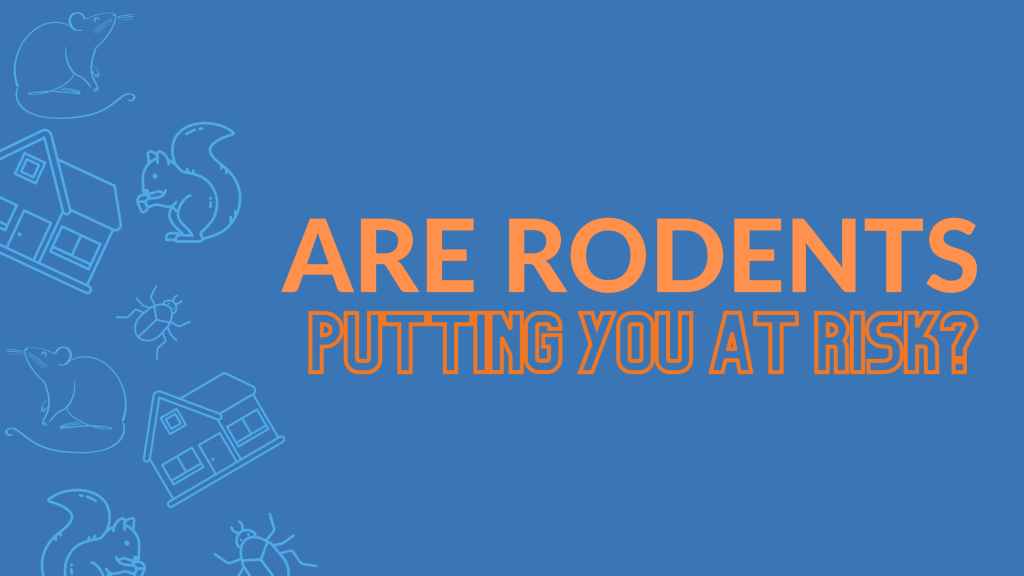Rodent Pest Control & Elimination

During the winter months, it’s not uncommon to encounter a rodent that has made it’s way into your home seeking protection from the cold. What most homeowners don’t realize, though, is that these sneaky critters can end up being more than just a spooky nuisance. Rodents, particularly rats and mice, are associated with a number of serious health risks. Rats, alone, are known to carry and spread more than 35 diseases that can be transmitted to humans through direct handling of live or dead rodents, contact with their feces, urine or saliva, or through bites. Indirectly, diseases can also spread from rodent to human via fleas or mites that have fed on an infected.
Why Rodents Are So Dangerous
- Disease transmission: Rodents can transmit diseases to humans through their droppings, urine, and saliva. Some common diseases transmitted by rodents include Hantavirus, Salmonella, Leptospirosis, and Rat-Bite Fever.
- Property damage: Rodents can cause extensive damage to property by chewing on wires, insulation, and other building materials. This can create a fire hazard and cause expensive repairs.
- Contamination: Rodents can contaminate food and water sources, leading to food poisoning and other illnesses.
- Allergies and asthma: Rodent droppings and urine can trigger allergies and asthma in some people.
- Infestations: Rodents can reproduce quickly and create large infestations in homes and businesses, which can be difficult and expensive to eliminate.
In addition, some rodents such as rats can be aggressive and may bite humans, which can lead to injury and infection.
Overall, it’s important to take steps to prevent rodent infestations and to eliminate them quickly if they do occur to reduce the risk of disease transmission, property damage, and other potential hazards associated with rodents.
How To Prevent Rodents In The Winter Months
Rodents are more likely to seek shelter indoors during the winter months, as they try to escape the cold weather. Here are some steps you can take to prevent rodents from entering your home during the winter:
- Seal cracks and gaps: Seal any cracks, gaps, or holes in your home’s foundation, walls, and roof with caulk or other sealant to prevent rodents from entering.
- Keep a clean home: Rodents are attracted to food and water sources, so keep your home clean and free of clutter. Store food in sealed containers, and clean up any spills or crumbs promptly.
- Trim trees and bushes: Trim any trees or bushes near your home to prevent rodents from using them as a bridge to access your home.
- Store firewood away from your home: If you use firewood, store it at least 20 feet away from your home to prevent rodents from using it as a nesting site.
- Inspect your home’s exterior: Inspect your home’s exterior regularly for signs of rodent activity, such as droppings or gnaw marks.
- Use rodent-proof containers: Store pet food and birdseed in rodent-proof containers to prevent rodents from accessing them.
- Install screens on vents and chimneys: Install screens on vents and chimneys to prevent rodents from entering your home through these openings.
- Consider professional pest control: If you have had a rodent problem in the past or if you live in an area with a high rodent population, consider hiring a professional pest control company to inspect your home and provide preventative treatments.
By following these steps, you can help prevent rodents from entering your home during the winter months and avoid potential damage and health hazards associated with rodent infestations.
How Professional Rodent Pest Control Can Help
A professional pest control company, like go2-pros, can help eliminate rodents from your home or business in several ways:
- Inspection: A rodent pest control professional will inspect your home or business to identify the extent of the rodent infestation, as well as entry points, food sources, and nesting sites.
- Treatment: Based on the inspection findings, a professional rodent exterminator will determine the most effective treatment plan, which may include traps, baits, and/or rodenticides.
- Exclusion: A pest control expert can also help prevent rodents from entering your home or business by sealing entry points, installing door sweeps and screens, and other exclusion techniques.
- Sanitation: A professional rodent control technician can advise on proper sanitation practices to eliminate potential food and water sources for rodents.
- Follow-up: A rodent pest control company will schedule follow-up visits to monitor the effectiveness of the treatment and make any necessary adjustments to ensure that the rodent infestation is completely eliminated.
It is important to choose a reputable rodent pest control company with experience in treating rodent infestations. Be sure to ask about the methods they use, their safety precautions, and their guarantee for their services. Additionally, follow any instructions provided by the professional to ensure that the treatment is effective and safe for you, your family, and your pets.
